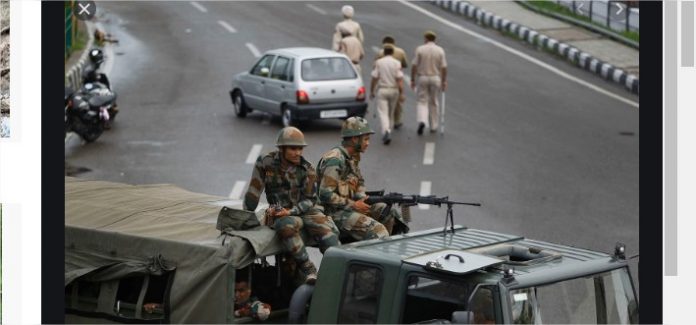DNA
Islamabad, 4 Aug: India’s siege of Jammu & Kashmir can be classified as a military occupation through unilateral annexation which stands in violation of international law.
India has been perpetuating atrocities in J&K that come under crimes against humanity, crimes of aggression and war crimes, according to international laws. This necessitates setting up of an independent war crimes tribunal to investigate atrocities committed by the Indian occupying forces and intervention of the International Criminal Court to initiate proceedings against all perpetrators
These findings are part of a legal fact-finding report titled ‘Kashmir’s Statehood Abrogated’, co-published by Institute of Policy Studies (IPS) and Legal Forum for Oppressed Voices of Kashmir (LFOVK), which was released on Tuesday. It provides in-depth information about the situation in J&K during the past one year since India abrogated Articles 370 and 35A of the Indian constitution, revoked the region’s special status and annexed it illegally. These actions have made the situation even worse in Indian Occupied Kashmir which is under lockdown since August 5, 2019.
The report finds that India fulfils the definition of occupation under Article 42 of The Hague Regulations 1907; stands in violation of the fundamental rights of civilians under The Hague Regulations and Geneva Convention IV Articles 47-48, Additional Protocol 1, Article 75; stands liable for committing the crime of aggression via unilateral annexation in contravention of Article 8 bis2(b) of the Rome Statute; and has violated all four Geneva Conventions. As such the siege goes well beyond just a blockade of the entry and exit points.
The report urges the international community to fulfil its responsibility and seek an interim remedy under the UN Responsibility to Protect norm to stop further aggression of Indian forces.
The human rights abuses perpetuated by India include curtailment of religious rights, constraints on economic development, curbs on freedom of communication via the internet and telephone lines, restrictions on journalists, denial of the right to education, banning freedom of movement, along with the imposition of curfews, infliction of torture and arbitrary detentions.
Furthermore, India stands in violation of International Humanitarian Law due to the use of lethal weapons, sexual violence against women, illegal change in the demographic structure by bringing in people from outside the region after changing the provisions for domicile, inadequate response to the Covid-19 pandemic and destruction of civilian property.
The report, while citing scholars, says India’s introduction of the new domicile laws during the Covid-19 pandemic has created implications of demographic change and delimitations that will redraw the parliamentary and assembly constituencies in favor of those regions more receptive to the Indian government such as Ladakh and Jammu, thus tilting the balance of power from the historically majority Muslim Kashmir state to Jammu.
The report explains that Article 7 (1)(d) of Rome Statute defines deportation or forcible transfer of population as a “crime against humanity”. ILC Draft Code of Crimes against the Peace and Security of Mankind 1991 and 1996 term changes to the demographic composition of an occupied territory as an “exceptionally serious war crime”.
In order to fulfil the mandate of the UN Charter the international community should demand of India to improve the avenues of internal self-determination by providing justice to the human rights victims, revoke the discriminatory laws, provide mechanisms for representative governance and restore the autonomy of the region. Giving the precedent of Kosovo and East Timor, the report says the people of J&K have the right to external self-determination through remedial secession because of the absence of opportunities for internal self-determination.
The report also calls upon the UN Security Council to refer this case of illegal annexation and demographic change to the International Court of Justice.
The foreword has been written by Justice (retd) Ali Nawaz Chowhan, formerly International Judge of UN at The Hague and chief justice of Gambia in which he states, “The Indian government is trying to change the demographic structure by bringing in people from outside the region and after changing the provisions for domicile Kashmiri land is being doled out for creating non-Kashmiri settlements. All this is in violation of international law. An occupying force cannot create any right for itself nor can it validate its actions. We should seek an interim remedy under the UN Responsibility to Protect (R2P) norm to stop further aggression of Indian forces in the occupied territory”.

















